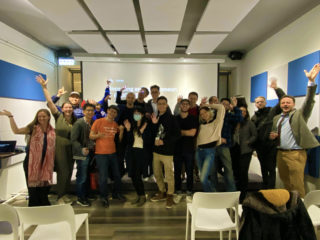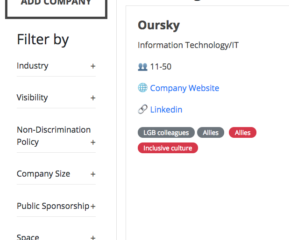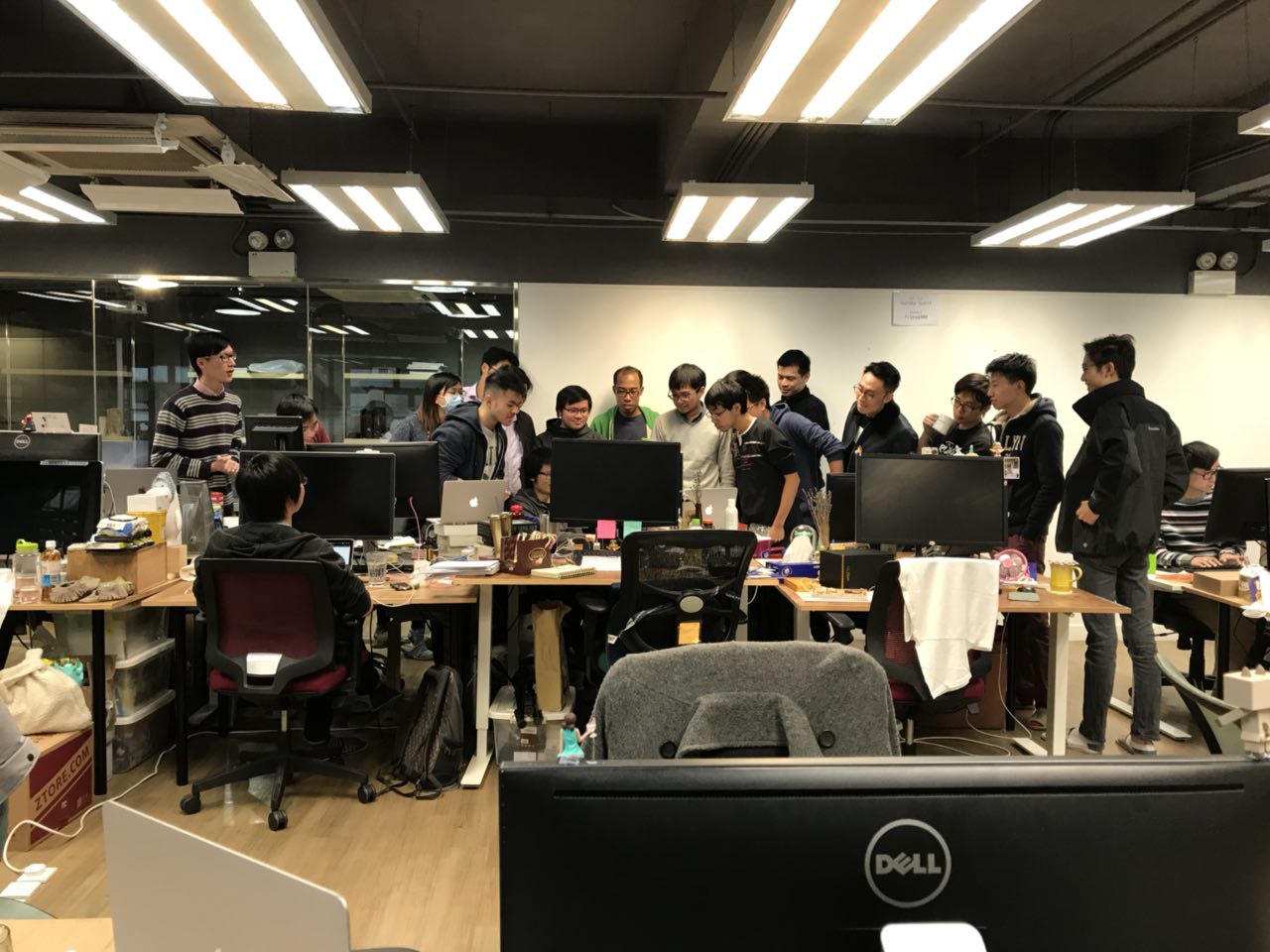
I’m a typical developer geek and introvert — the type that just sits and listens in social gatherings and has nervous habits for public speaking. But I’m not stuck in a dark basement, and you might be surprised to know I run a web and mobile development agency with over 40 people. In fact, my company’s been around for 9 years and worked with clients like Thompson Reuters and other international companies.
To my fellow introverts: sorry, it doesn’t get easier. But it does get a bit better, and I’ll try to share the things that worked for me over the years that help me cope — maybe even succeed — in putting myself out there so that I can get contracts and pay the team members I’ve recruited and love working with.
Be geeky and passionate.

I started Oursky because I love to code. I just wanted to code all day and I found two friends to do that with me (Rick and Roy). Back then, I didn’t think about growing a company, but the idea that I could find other people to discuss ideas and build things with was really appealing. When we started, Rick, Roy, and I built Pandaform, which became our flagship product for a few years before we decided becoming an agency was a more stable way to make rent while doing the coding and problem solving we loved to do.
When we moved to taking client work, we were a small team that could only take one or two projects. We made enough for ourselves, so we could focus on quality code (and later UI & UX). When we got more referrals, we were able to grow organically by attracting both clients and developers who appreciated our attention to clean code. Because we stayed close to our geeky tendency, we appreciated other developers who were nerdy enough to work with Kubernetes, ClojureScript, hardware, and deep learning. They, in turn, feel motivated to share their talents and experience with our company once they join.
Take a stance.

Don’t worry about being hated. You’ll always do things people don’t agree with. For me in Hong Kong, I think there will be as many people who take issue with my politics as they do with me running a company with flat structure. Some of these people who disagree will be developers. But I don’t need to waste energy trying to attract those ones. I just need to find the ones who wake up when they hear “flat structure” and “flexible hours”. They will appreciate what my company offers and the energy they bring will make an introvert like me want to come to the office and chat rather than hide at home.
Does that mean I need to agree with everyone?
No. Introversion isn’t an excuse to be conflict-adverse or to only hire people who mirror me. I’ll admit, when I’m frustrated with conflicts in the office, I might still have that hesitation to come back and I wish I could just hide somewhere. I hate that feeling. But at least I’m aware, and I still show up because an awesome team includes colleagues who have different opinions and can make good cases for them. Open discussion and exchange of ideas is essential to product development.
Online => one to one.

But, what if it’s difficult to even start a conversation, never mind having a disagreement?
Because I have 1) my geeky interests, and 2) my values, I have topics I can talk passionately about. You can sit down and make a list if you’re not sure. Everyone has something.
Then, take those interests and values and start an online conversation with someone first. Instead of going to a networking event and putting yourself awkwardly into group conversations, you can get someone one-to-one. For example, I am always open to conversations with strangers, but encourage them to share their work first so that I have things I could ask them. When I first began, I had an portfolio that helped people find a common topic. As an introvert, if you want to meet someone offline, it usually means you’ll end up having long and interesting conversations — that’s what happened for me with many of the team members I later hired.
Have a standard self-intro / one-liner.
What do you do when someone ambushes you at an event? Panic, of course, just on the inside. But as a founder, I had to go to events to recruit team members and get clients. I found my solution in automation. I prepared a standard intro line. It is like running a script that can at least get me past level one. Maybe it sometimes seems awkward or “canned”, but most people don’t walk away.
Optimize yourself.

If I had known a decade ago I wouldn’t touch any code now, I’m not sure I’d have started the company. In fact, I looked through every line of code until our company grew past 12 people. I only began learning — forcing myself — to let go after I realized I was the bottleneck holding back the team from shipping on time.
Instead, I had to learn a new skill my introverted self would never have willingly signed up for: managing people. But, by then, I already had a team, and being introverted wasn’t an excuse.
The first management book I read was Behind the Closed Door and two other books that stand out for me are The Hard Thing about Hard Things and Holacracy. These books helped highlighted traits and habits that matched my character and my approach to people. Through them, I realized that effective management wasn’t about being extroverted or introverted. The Hard Thing about Hard Things, made me realize that successful leaders screw up too, so maybe I don’t have to blame myself too much. In Behind the Closed Door, I learned to have one-on-ones, which made my introverted personality an advantage since I liked having in-depth conversations. Holocracy made me recognize the things that my company developed naturally: autonomy and flexibility for individuals, roles-based assignments, and data-driven decision making process with a flat team structure.
This approach attracted people with strong work ethics because our expectation is that they deliver quality if we give them work-arrangement flexibility.
Of course, the suggestions in the books may not work for everyone. The point is to find resources that you can relate to and action on. I developed the mindset that improving my leadership is an optimization problem (not an “I need to be more extroverted” issue) and continually iterating based on what worked for me, and also my team.
Also, now that my company has developers who are equally passionate about code, update themselves regularly, and share with their colleagues often, I’ve realized that listening in on their discussions and holding product meetings with them is another type of fun I never knew existed when I was coding on my own.
Transparency is important to me.

Ourskyers are kinda crazy, in a good way, and I often share office stories with everyone. I don’t filter how impressed, disappointed, proud, or surprised I feel about my team. My Facebook friends will see one-line comments about my companies and full-paragraph reflections. Of course, there is a professional company boundary (such as confidentiality with clients), but I don’t feel the need to pretend like everything is perfect, especially when people around me can see I’m stressed. Usually, I get encouraging comments from within and outside the company.
Be authentically transparent, not polished.
Of course, I also need to address my team. When I have company updates, make policy changes, or announcements, I don’t prepare speeches. Sometimes, I stop explaining half-way through with something like “I think everyone gets this” or “Okay, I know everyone wants to eat”. If something isn’t clear, someone will shout out a question, and they know that the door is always open for communication.
Even though a part of me will always be a bit awkward about speaking in a group, but I’m comfortable with that “awkwardness” and so is my team. I guess when you spend 8+ hours a day with these people, they become family. One of the things I love most is going out for lunch or dinner with everyone.
It’s not all about talking.

Lastly, communication is more than just talking. As an introvert, writing is sometimes easier. Writing helps me get my ideas down and ask for everyone’s feedback. Usually, we use Quip for documentation and ongoing updates. Other tools such as Slack, Github, and Pipedrive all have message features for direct commenting. While technology doesn’t replace face-to-face meetings, it helps me engage with others (many who are also introverts), whether in discussing strategy or giving feedback about a proposal, design, or product feature. As the person that brought most of these team members into the company, the most important thing is that everyone feels they have an open channel of communication with me and their teams.
Conclusion.

Geeky introverts like me don’t think of “leadership opportunities” as opportunities — more like burdens sometimes. But for the ones who accidentally fall into it, the good news is there’s more than one approach to leadership. In fact, because I’m an introvert, I attracted people who were more like me and accepting of my style. Looking back, the first step was just to focus on what I loved to do: focus on quality code. Even though I interviewed and chose qualified team members, these talented people also chose to trust me as a leader.
Respect isn’t something I could demand — it was what my team gave me.
If you found this piece helpful, follow Oursky’s Medium Publication for more startup/entrepreneurship/project management/app dev/design hacks!










